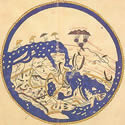
In the European Middle Ages the destruction of Troy was seen as a pre‑Christian analogue to the Fall of Man. As such, it provided a non‑theological model for analyzing why bad things happen to rather decent men and women.
John Lydgate translated Guido's text into an influential Middle English version, the Troy Book, so his work is relevant to the study of Guido's Historia.
| |||
ETEXTS
- "The Book of Troy and the Genealogical Construction of History: The Case of Geoffrey of Monmouth's Historia regum Britanniae." Francis Ingledew. Speculum, Vol. 69, No. 3 (Jul., 1994) , pp. 665-704. Accessible online through the JSTOR database at many libraries. (NVCC subscribes to JSTOR)
- Dares and Dictys : An Introduction to the Study of Medieval Versions of the Story of Troy by N. E. Griffin (1907).
- "Guido's Historia Destructionis Troiae: Free Will, Fate and Demons at Troy" by Diane Thompson
- Nolan, Maura ""Now Wo, Now Gladnesse": Ovidianism in the Fall of Princes" [Excerpt] ELH - Volume 71, Number 3, Fall 2004, pp. 531-558 [full text available online through libraries that subscribe to Project Muse]
- Poetics of the Past, Politics of the Present:: Chaucer, Gower and Old Books. Diss., Malte Urban. University of Wales, Aberystwyth, 2005. Loads very slowly and then scroll down to see the start of the text.
HISTORY
- Early and Medieval History of Sicily: The Middle Ages; includes a link to a bookstore that sells excellent books about the history of medieval Sicily.
- The History Guide: Lecture 27: Heretics, Heresies and the Church
- Muslims in Norman Sicily: by Salah Zaimeche; an interesting article on the Muslim influence on Sicily.
- Sicilian Peoples: The Normans; an essay with images by Vincenzo Salerno
SCIENCE/MAGIC IN 13th C. SICILY
- "Astralscapes of the Emotions: Planets, Seasons, Passions, Actions." Essay on Guido's use of the stars to describe human events. By Diane Thompson
- Astrology in Medieval Europe: scroll down after following the link to find the essay.
- History of Astrology: in Wikipedia
- Magic in the Middle Ages: Reviewed by Patrick Curry
- Medieval and Renaissance Astrology and Medicine: by Robert Zoller, 1992.
- Medieval Cosmology: Includes a great diagram of the universe at that time.
- Science in the Medieval Islamic World: from Wikipedia
LYDGATE
- Fewer, Colin "John Lydgate's Troy Book and the Ideology of Prudence" The Chaucer Review - Volume 38, Number 3, 2004, pp. 229-245 [full text available online through libraries that subscribe to Project Muse]
- TROY BOOK: INTRODUCTION; edited by Robert R. Edwards. Originally published in John Lydgate Troy Book: Selections. "Lydgate's poem is one of several translations of Guido's Historia into Middle English."
FREDERICK II
- Emperor Frederick II: an essay by Beniamino Inserra
- Frederico II Museum: a lot of nice images; text is in Italian.
- Stupormundi.it: history and art related to Frederick II; English option, but most of the good stuff is in Italian.
- Frederick II: Holy Roman Emperor; from Wikipedia
- Medieval Sourcebook: Philip de Novare: Les Gestes des Ciprois, The Crusade of Frederick II, 1228-29
MAP
ART
- Art in Sicily
- Judgment of Paris: a 16th century painting by Lucas Cranach the Elder (German, 1472-1553), based on Guido's Historia; some interesting background comments
 Different versions of the Troy story focus blame on various causative factors, including the gods, demons, stars, fate, Fortune, and Amors, as well as human folly, more or less freely exercised. The Historia Destructionis Troiae, completed in 1287 by Guido de Columnis, is particularly interesting because of its complex, undigested mixture of fate and free will. Guido was a judge and poet associated with the Sicilian Court of Frederick II, a place where newly translated Greco‑Arab theories of scientific determinism coexisted with Christian free will. A man of his time, Guido struggled with the conflicts between the fates that destroy men and the free will which ought to be able to protect them, but he reached no satisfactory resolution.
Different versions of the Troy story focus blame on various causative factors, including the gods, demons, stars, fate, Fortune, and Amors, as well as human folly, more or less freely exercised. The Historia Destructionis Troiae, completed in 1287 by Guido de Columnis, is particularly interesting because of its complex, undigested mixture of fate and free will. Guido was a judge and poet associated with the Sicilian Court of Frederick II, a place where newly translated Greco‑Arab theories of scientific determinism coexisted with Christian free will. A man of his time, Guido struggled with the conflicts between the fates that destroy men and the free will which ought to be able to protect them, but he reached no satisfactory resolution.